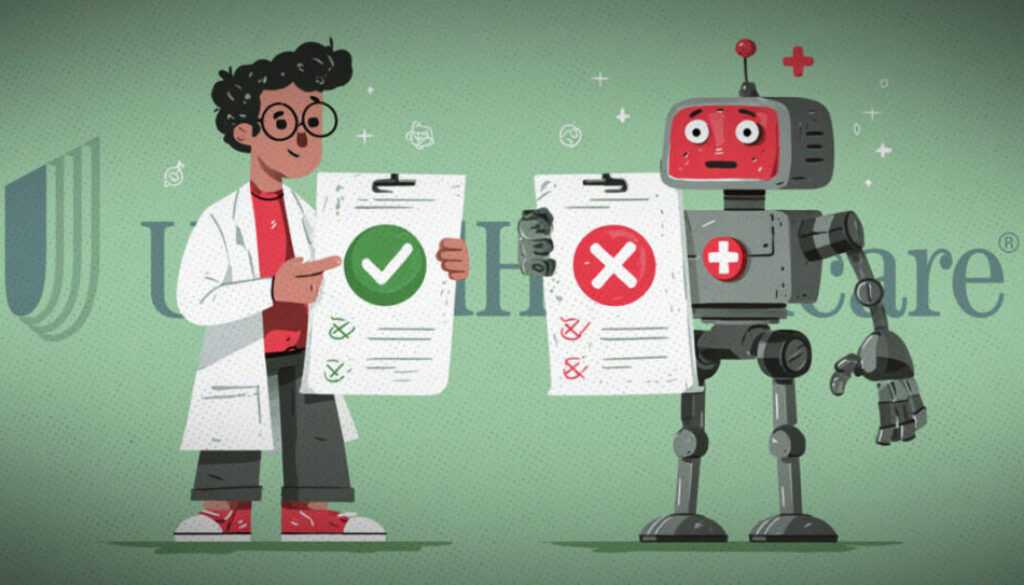Could AI help battered UnitedHealth turn around? CEO ‘very optimistic’

While use of artificial intelligence in the administration of health insurance continues to be controversial, even litigious, UnitedHealth Group is banking on AI to help restore its financial house.
The wobbly insurance giant welcomed Wall Street analysts last week to discuss mixed second-quarter earnings. UHG executives answered every question, vowed to review every aspect of operations and exit Medicare and ACA plans if they are not contributing to the bottom line.
Investors remain skeptical and UHG shares dropped more than 18% since the July 29 earnings release. The day after the earnings release, Fitch Ratings downgraded UnitedHealth’s outlook to “negative,” despite giving the insurer a “very strong” financial strength rating.
“[D]evelopments that may challenge UnitedHealth in its margin recovery efforts include ongoing elevated healthcare utilization trends, potentially higher acuity in the Medicaid risk pool,” Fitch analysts wrote.
The stakes are high, UnitedHealth executives acknowledged, with several speakers returning to technology and AI as a critical solution.
“I intend to accelerate it to really infuse this entire enterprise with an AI-first orientation and to also use that as a means to develop the capabilities to revitalize products really across the enterprise,” Hemsley said.
‘Efficiency gains’
AI is an integral part of Optum Health’s rebound strategy, explained Dr. Patrick Conway, CEO of Optum, a UnitedHealth subsidiary. Optum Health’s 2025 earnings are approximately $6.6 billion below UHG expectations and a major problem for the insurer.
In addition to improving performance, “margin recovery” and raising rates, Optum is counting on efficiency improvements as well, Conway said.
“We will complete the final stages of our technology integration, which will enable meaningful advances with emerging technologies like AI to drive efficiency gains,” he explained. “For 2026 we expect to deliver almost $1 billion in cost reductions.”
Dhivya Suryadevara is the CEO of Optum Financial. She said payers and providers both are looking for “tech-forward solutions” to improve their own businesses.
Optum rolled out a new AI-powered revenue cycle management solution in May 2025, Suryadevara noted. Core RCM functions include things like clinical documentation review, medical coding, and billing—all within a unified interface.
“Later this year, we’ll be launching a AI-powered, real-time coordination of benefits,” Suryadevara said. “So think of this as early innings in our product journey, and we’re going have more launches coming out in the coming quarters and years, which makes me very optimistic about the future of the business.”
AI claim denial lawsuits
While AI might be a game-changer for efficiency, the use of AI to handle claims led to lawsuits for some health insurers, including UnitedHealth. Cigna and Elevance Health are also facing scrutiny for use of AI in claims.
In a California lawsuit plaintiffs say Cigna used an AI system called PXDX to automatically deny claims in 1.2 seconds, without proper physician review. Cigna denies the allegations and the case is proceeding in the Eastern District of California.
In the UnitedHealth lawsuit, plaintiffs claim that the insurer relies on an algorithm to deny rehabilitation care to seriously ill patients, even as UnitedHealth is aware that the algorithm has “a 90% error rate.”
The class-action lawsuit was filed by past patients or their heirs who had a UnitedHealthcare Medicare Advantage plan. It followed an in-depth investigation by STAT, which covers health and science news, detailing how UnitedHealth allegedly used a computer algorithm to cut off care to older patients.
The STAT report claimed that internal documents show UnitedHealth managers set a goal for clinical employees to keep patients rehab stays within 1% of the days projected by the algorithm.
UnitedHealth has denied the allegations, stating that the AI tool is not used to make coverage decisions but as a guide for providers and that the lawsuit is without merit. A federal judge has allowed some of the claims in the lawsuit to proceed, while dismissing others.
© Entire contents copyright 2025 by InsuranceNewsNet.com Inc. All rights reserved. No part of this article may be reprinted without the expressed written consent from InsuranceNewsNet.com.
The post Could AI help battered UnitedHealth turn around? CEO ‘very optimistic’ appeared first on Insurance News | InsuranceNewsNet.





